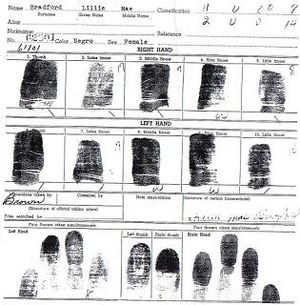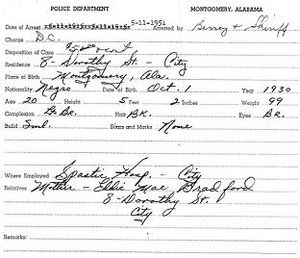Lillie Mae Bradford facts for kids
Lillie Mae Bradford (born October 1, 1928 – died March 14, 2017) was an American civil rights activist. She took a stand against unfair rules on a city bus in Montgomery, Alabama. This happened four years before Rosa Parks did something similar. Lillie Mae was arrested for her actions. She showed great bravery by challenging the rules of segregation.
Contents
Lillie Mae Bradford's Bus Stand
The Bus Ride in 1951
On May 11, 1951, Lillie Mae Bradford was riding a city bus. She noticed that the bus driver had charged her the wrong price. This was a common problem that cost passengers extra money.
Lillie Mae asked the driver to correct her ticket. The driver told her twice to go to the back of the bus. Instead, she sat down in the front section. This area was usually reserved for white passengers.
Why She Took a Stand
Lillie Mae was on her way home from work. She cared for disabled white children. She had paid for a transfer ticket to another bus. But the driver had punched it incorrectly. If she did nothing, she would have paid too much.
She later said, "I thought if I don't get up and start speaking for my rights, I never will." She felt it was wrong and humiliating. Going to the front of the bus was not allowed for Black people. But she went anyway to explain the mistake.
The driver told her to go to the back. Lillie Mae replied that she would, as soon as he fixed her ticket or gave her money back. Then she sat in the front. The driver never fixed the ticket. Lillie Mae stayed in the front seat.
Her Arrest and Its Impact
Because she refused to move, Lillie Mae Bradford was arrested. The police charged her with "disorderly conduct." She was booked, fingerprinted, and had to pay a small fine. A neighbor helped bail her out of jail.
This arrest affected Lillie Mae for many years. She said it stopped her from getting jobs she applied for. When applying for federal clerk positions, she would pass the tests. But she would not get the job. She believed it was because she had a police record.
Fighting for Justice: The Rosa Parks Act
Seeking a Pardon
In 2006, a new idea came up in Alabama. A politician named Thad McClammy suggested giving formal pardons to civil rights activists. A pardon means officially forgiving someone for a crime. Some activists did not want a pardon. They felt they had not committed any crimes in the first place.
The Rosa Parks Act
In April 2006, the Rosa Parks Act was passed. This law allowed activists, or their families, to ask for a pardon. This meant their arrest records could be cleared.
In 2007, Lillie Mae Bradford wanted to apply for a pardon certificate. She knew it would not change her past. But she wanted her record cleared. She said, "I want to have it removed, frame it, and put it on the wall." She wanted it to show that she was arrested for fighting for her rights.
Lillie Mae Bradford's Legacy
Lillie Mae Bradford lived in Montgomery, Alabama, with her sister Helen. She passed away peacefully on March 14, 2017. She was buried in Montgomery's Greenwood Serenity Memorial Gardens. People remembered her as a "pioneer" of the Civil Rights Movement. Her brave actions helped pave the way for others.
 | George Robert Carruthers |
 | Patricia Bath |
 | Jan Ernst Matzeliger |
 | Alexander Miles |




